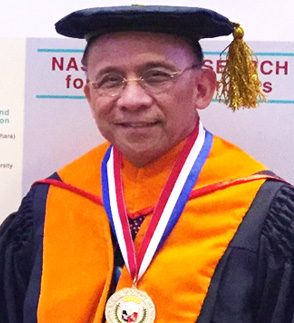
Wayne State University School of Medicine Professor of Pediatrics Enrique Ostrea Jr., M.D., was inducted into the National Academy of Science and Technology of the Philippines during a special investiture ceremony held during the organization's annual scientific meeting July 13-14 in Manila.
Dr. Ostrea, a neonatologist, was elected as a corresponding member - given to those who live abroad but have significantly impacted science and technology in the Philippines - for his contributions to the field of pediatrics, neonatal hyperbilirubinemia and neonatal drug addiction, including his pioneering work on the detection of fetal exposure to drugs, tobacco, alcohol and environmental toxicants by analysis of meconium, a newborn's first stools.
"It was a great honor and privilege to have been elected a member of the National Academy of Science and Technology of the Philippines. It is the Philippines' highest and most prestigious organization in science and technology. There are only a limited number of members of the academy, and I am happy and proud to be one of them," he said.
Dr. Ostrea was nominated for membership by University of Philippines Manila Chancellor Carmencita Padilla, M.D.
"The candidate is rigorously reviewed and voted on by all members of the academy. Only a few of the candidates are accepted, particularly on the first pass. I was fortunate to have made it on the first pass," Dr. Ostrea said.
He graduated from the University of the Philippines School of Medicine in 1965, completing his residency in Pediatrics at Children's Hospital Medical Center, Harvard Medical School in Boston, and his fellowship in Neonatology at Johns Hopkins Hospital in Baltimore. He has served as chief of Pediatrics and director of University Nurseries at the Detroit Medical Center's Hutzel Women's Hospital.
Dr. Ostrea received the Outstanding Faculty Recognition Award from WSU's Board of Governors in 1990 and was elected a member of the WSU Academy of Scholars in 2012. He has received research grants from the March of Dimes, the Michigan Department of Public Health and the National Institutes of Health. He also is an adjunct research professor of the Institute of Child Health and Human Development, National Institutes of Health, University of the Philippines Manila. He has visited the Philippines annually since 1976 as a lecturer, visiting professor and consultant to universities, hospitals and medical centers in metropolitan Manila and other provinces, training more than 33 Filipino neonatologists.
His previous studies also looked at fetal exposure to environmental pesticides and its long-term effect on neurobehavioral development. He collaborated with scientists at the University of Philippines' NIH and the Department of Science and Technology of the Philippines in a clinical study to improve IQ and cognitive functions among preschool-age children given snacks fortified with Moringa oleifera, a deciduous tree that can be used as a food supplement to combat malnutrition. The results of the study showed significant improvement in childhood IQ.